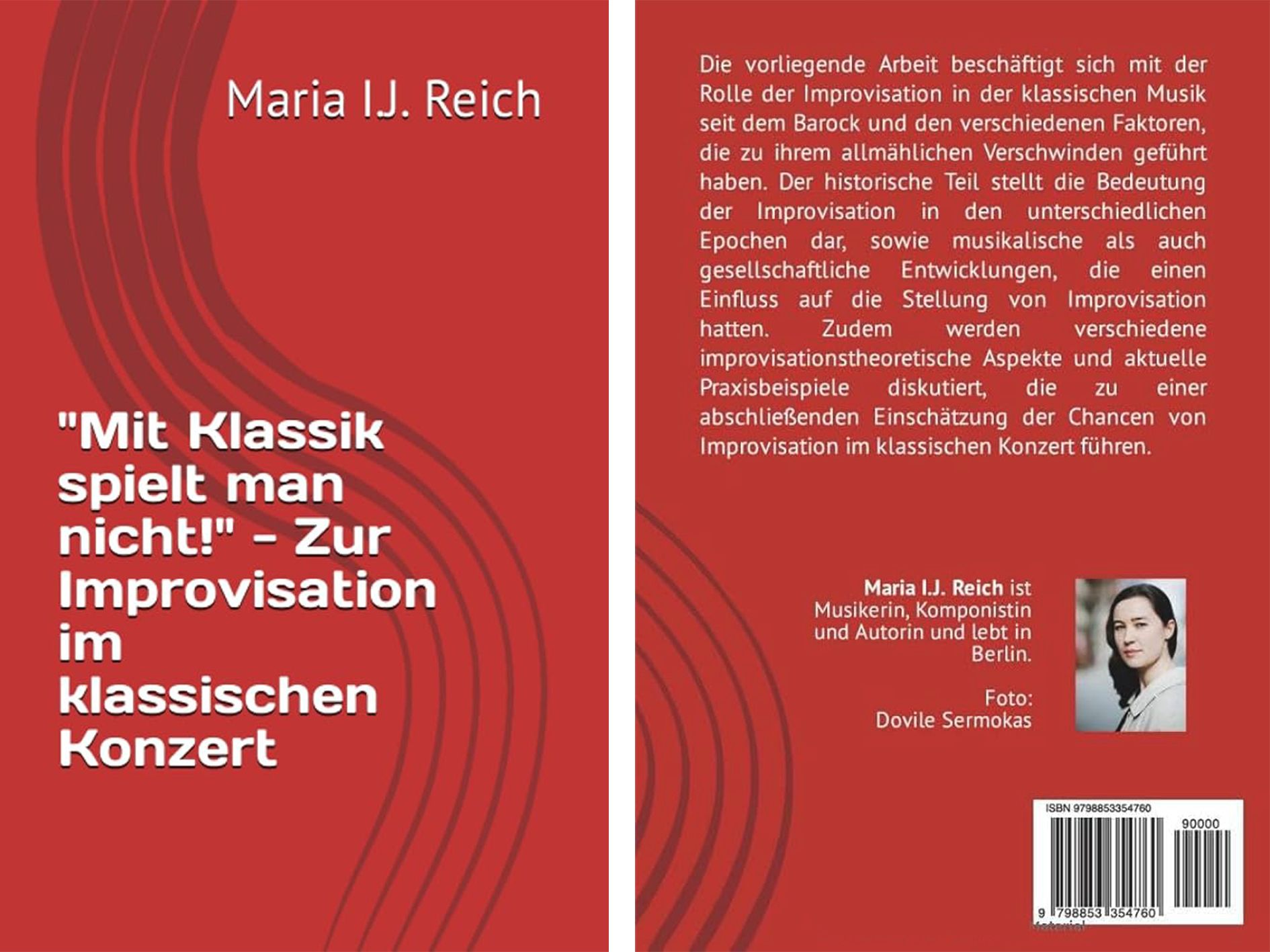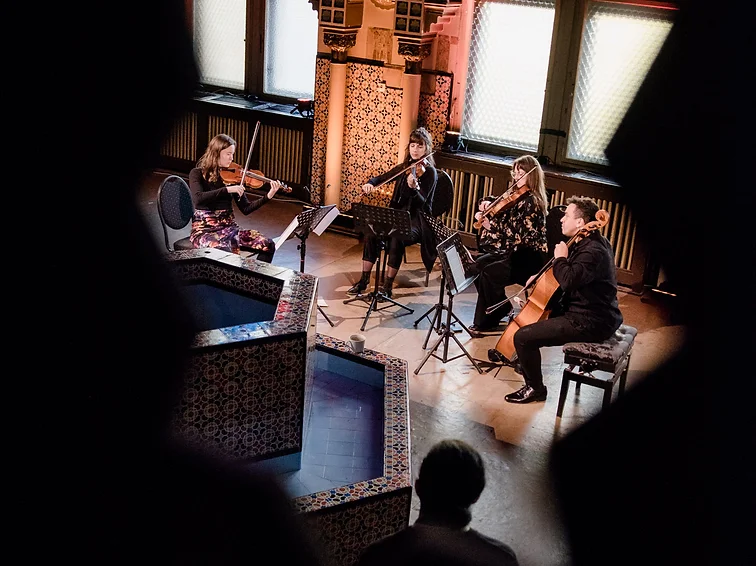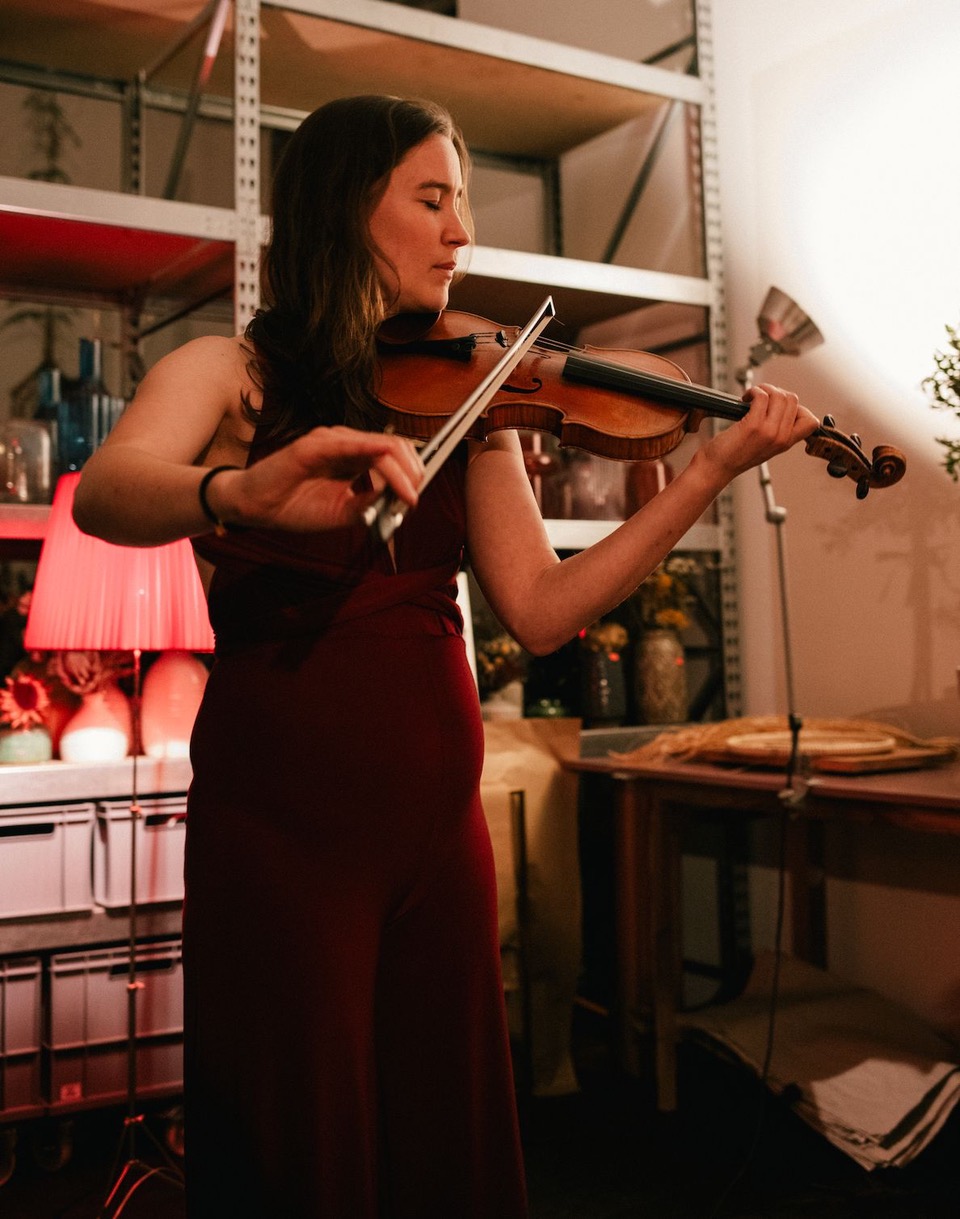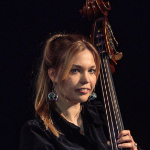You don't play around with classical music?
24. October 2023
#1to1dialogues
_1.jpg) © Dovile Sermokas
© Dovile Sermokas
Welcome to our new interview series 1:1 DIALOGUES. Over the next six months, our artistic directors Franziska and Christian will meet selected guests from the extended circle of the 1:1 COMMUNITY. Every four weeks, we will have an interview online - live on Instagram - about topics that are close to our hearts or are currently part of our projects. The format is as simple and intensive as you know it from the 1:1 CONCERTS: 2 interlocutors open up a resonance space that is as personal as possible for 15 minutes.
Franziska started the 1:1 DIALOGUES in October and met with violinist and violist Maria Reich, who has played many 1:1 CONCERTS in Berlin and Rome. Here you can read the transcribed, slightly extended version of the interview or watch the video recording of the conversation between Franziska Ritter & Maria Reich on 19 October 2023:
Franziska and Maria know each other as musicians from the orchestra of the German National Academic Foundation and spent a lot of time with "Dido and Aeneas" on the beautiful island of Mauritius (incidentally, the oldest opera house in the southern hemisphere is located there). In addition to her busy work as a (jazz) musician, Maria is also a cultural scientist, composer and author. The occasion for our conversation is Maria's recently published book "Mit Klassik spielt man nicht? Zur Improvisation im klassischen Konzert". („You don‘t play around with classical music? On Improvisation in Classical Concerts.“)
1:1 CONCERTS wouldn't exist if the 1:1 COMMUNITY hadn't displayed a great talent for improvisation, especially during the pandemic when the project was growing. We built up a system in no time at all - virtually off-the-cuff - and improvised every day anew, with a lot of pleasure and joy in playing, without knowing exactly beforehand where and with whom the journey was taking us. For the 1:1 TEAM, improvisation is and remains a core competence in our everyday work. And of course improvisation in the musical sense plays a big role in the 1:1 CONCERTS themselves. Many classically trained musicians dare to work more freely with the works in this setting and to improvise, which might not happen so often in their practice otherwise.
Franziska: For me as a classically trained, sight-reading flutist, improvisation is and remains a place of longing with great fascination. So far, I have not dared to venture there. Maria, have you already improvised today? And how did you come to improvise?
Maria: A very nice introductory question. Yes, I hope and I definitely believe that I have already improvised today - in one of the many situations that turned out to be different than I thought beforehand. In a musical context, this has been going on in my life for a long time, because I grew up in a musical environment in which a lot of improvisation took place. The fact that I think about it on a philosophical level came much later. It was perhaps more implicitly on my mind, but I didn't yet link it to the concept of improvisation.

Im Sommer 2023 erschienen: "Mit Klassik spielt man nicht!" - Zur Improvisation im klassischen Konzert. Bestellbar über Amazon für 17 Euro.
In 2014, you completed your Bachelor's degree in Cultural Studies at Zeppelin University Friedrichshafen under Prof. Martin Tröndle with an academic thesis on improvisation: "You don‘t play around with classical music? On Improvisation in Classical Concerts.“ How has the study of this topic influenced your life?
This work actually triggered me to go back to stuyding music but I wanted to choose an institute where improvisation plays a role. That's why I chose the Jazz Institute Berlin, because at that time it wasn't common elsewhere - at least in Germany - at other classical faculties.
From this semester on, I'm teaching string improvisation as a lecturer at the HfM Dresden and on this occasion I thought: I've actually done so much research on this and would like it to finally appear in book form. This summer I had a bit of time and then took care of self-publishing the book. That, in turn, has developed its own momentum. It's very nice to see that so many people are interested in it, because I find the topic very important and exciting myself.
Can you actually learn to improvise? And why is it also a necessary competence for classical musicians?
I am very optimistic about that. All people who improvise on their instrument have learned it and no one could do it when he or she came into the world. Of course anyone can learn it! I don't know if it's a necessary skill or who decides about that. In any case, it is an enriching competence and I wish for all young musicians who study at a university today and in the future to find their freedom there.

Maria Reich Quartett spielt "Music for String Quartet" Kompositionen von Maria.
Let's look into the book for a moment. "You don't play around with classical music!" That was not always the case. Where does this "belief" come from? Can you take us on a short journey into the past of music history?
Absolutely! This sentence is so provocative, it sounds like a ban or something you say to little children, doesn't it? And I think I came up with this title at the time because I had precisely this impression that the authorities in this context sometimes convey something along these lines: You have to have respect for the score, it's a matter of very strict faithfulness to the work! So you are not allowed to change so much, indeed you have to treat the work with such religious respect. And in my case, I had the feeling that this did not help me in my contact with music, but actually distanced me from music and from making music.
That's why I was interested in what it was like in the past centuries, and when I did a bit more research, it quickly became clear: Ah, in Bach's time it was completely normal to improvise. In Mozart's time, they had improvising competitions or improvised complex works and only wrote them down later. Beethoven also improvised. Franz Liszt says he found it difficult not to improvise, and so on. The more I looked into it, I thought: it can't be true that I grew up with the so-called classical music and didn't know that. It was really interesting to realise that improvisation is intrinsic to classical music, and not to improvise does justice to the context in which these works were created. this is what I present in my book. Furthermore, I show various factors that have led to improvisation and also the appreciation of improvisation disappearing further and further from the bourgeois concert context.
You just mentioned Franz Liszt and I want to quote him briefly from your publication (p.32): "Improvisation leads to an enhances contact between musicians and listeners". Contact is of course an aspect that is very important to us at 1:1 CONCERTS. Every concert begins in a quiet moment and a deep moment where musician and listener look into each other's eyes. At best, this "wordless" encounter creates a resonance space from which you as a musician can draw your inspiration and react spontaneously. How does this personal contact flow into your improvisations?
Yes, I think that this quiet initial moment makes it very clear what the great strength of improvisational readiness is all about. And it is certainly inspiring for all musicians who "only" play interpretations, so to speak, but who expose themselves to this very direct encounter in eye contact with the listener before they start playing. The idea is, as you say, that this encounter opens up a resonance field and transforms both people in a certain way. And clearly this also has something to do with the music. The idea is that it inspires you for your own playing. And I'm convinced that this creates a certain attitude towards the work or a different perspective on how one can also deal with written works. Personally, I also like to improvise freely in these settings because it allows me to do a lot of things. I also have the feeling that I am allowed to speak very directly to people through music. But there is certainly also room for other musicians at 1:1 CONCERTS who play notated works, which arises in this special playing situation and which can be used improvisationally.
 © Sevasti Giannitsi
© Sevasti Giannitsi
And what makes a good improvisation for you? Have you already found an answer for yourself?
Yes, that is definitely a wide field. I think for me it has a lot to do with being in contact with oneself and also being permeable with the environment, for "getting in touch" with sound. For me, that also means not enforcing so much - which is regularly a problem for many musicians when they play on an "ego-driven" level. It doesn't help improvisation because then it's often very top-heavy and because ideas or musical connections often arise from a more intuitive attitude. But if I want to show and prove a lot, then that can also keep you from really opening up to what is happening musically at the moment; in other words: listening to the sounds as they are at the very moment.
I think that's an incredibly exciting topic. I've already thought so much about what that means for me, this state, and it's a bit like life itself that sometimes you find this balance and then lose it again and that it's actually always a new search and sometimes even a finding. And then you have new clues again and think you've got it now and then you forget it again or lose it completely. That is also the beauty of it, that it is not controllable down to the last detail.
.jpg)
Das neue Album “Poème“ von Marias Trio Reich | Pringle | Baumgärtner mit frei improvisierter Musik für Violine/Viola, Klavier & Drums/Percussion erscheint am 15. Dezember 2023 bei stssts records!
Unfortunately, in our format, time is controllable, the 15 minutes are almost up, and although I could dive into the imponderable worlds of improvisation with you for hours, here comes the last question: What do you take with you from these improvisations at the 1:1 CONCERTS into your own musical practice? What remains?
Interesting question. Musically, it's maybe a mixture like that. Ideally, I don't remember so much afterwards, because I really improvise in the moment without reflecting so much. Then it comes rather via inner flashbacks, somehow delayed, that I think, ah yes, I did something like that, that was actually quite cool or I liked that. But ideally, this instance of evaluation is rather turned off during the act of playing.
What is so special about the 1:1 CONCERTS is that afterwards you get a kind of resonance in words. The listener writes me a letter teling me how he or she experienced the situation and the music. That's often super exciting for me, because usually otherwise you don't get that feedback directly after concerts and especially not in writing. It often stays with me for a long time afterwards.
Maria, thank you very much for this interview and I wish us all good playing energy and more room for improvisation!
